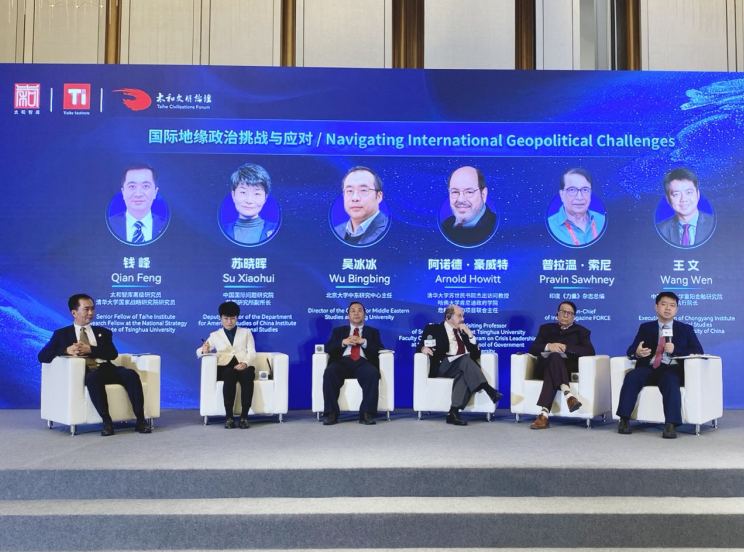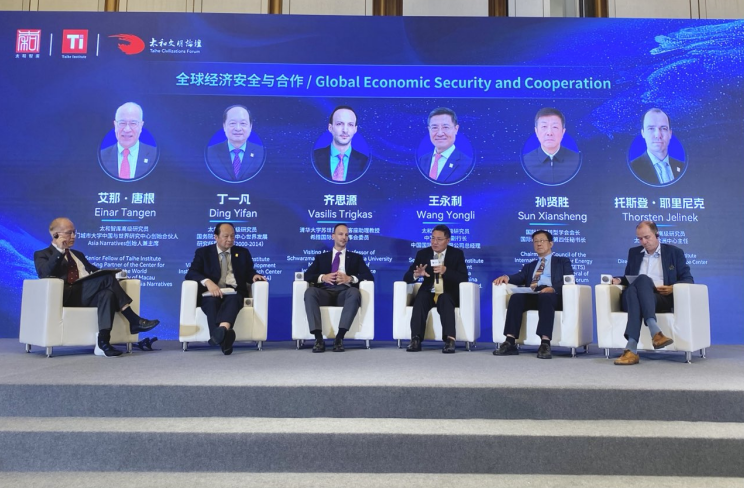The 8th Taihe Civilizations Forum sub-session on international relations: Navigating a shifting global order

BEIJING, Sep 24 (China Economic Net) - The 8th Taihe Civilizations Forum's (TCF) Sub-Session on International Relations, held in Beijing on September 20, 2024, brought together experts to discuss "Navigating the Changing International Political and Economic Landscape for Security and Development." The event was structured into keynote speeches and two panel discussions.
The changing face of global power
The keynote speeches painted a picture of a world in transition, moving away from U.S.-dominated unipolarity towards a more complex, multipolar system.
Wu Hailong, president of China Public Diplomacy Association, kicked off the discussion with a critical analysis of U.S. geopolitical strategy. He argued that the U.S. approach of building alliances to contain China has been ineffective and even counterproductive, spurring China's independent technological innovation. Wu suggested that Western nations could benefit more from embracing peaceful coexistence rather than fixating on geopolitical competition.
Echoing this sentiment, Zhou Li, former vice minister of the International Department of the CPC Central Committee highlighted the increasing volatility in the international landscape. Zhou noted the escalating arms race between the U.S. and Russia, while also observing a growing solidarity among developing countries to challenge established power structures.
The changing global power dynamics were further elaborated by Chen Wenling, chief economist at the China Center for International Economic Exchanges. Chen predicted six significant changes in the coming decade, including the collective rise of the Global South, challenges to US dollar dominance, and a shift in global energy trade from the Atlantic to the Pacific.
Against this backdrop of change, Nurlan Yermekbayev, deputy secretary-general of the Shanghai Cooperation Organization (SCO), emphasized the "Shanghai Spirit" as a foundation for a new type of international relations. He highlighted the SCO's role in maintaining global and regional security amid complex geopolitical challenges to foster a more equitable and sound international order.
Liu Zhenmin, China's Special Envoy for Climate Change, discussed the resilience of economic globalization despite increasing fragmentation arising from western “decoupling” and “de-risking” strategies. He noted that while geopolitical conflicts pose challenges, they are unlikely to fundamentally alter the strategic balance among major economies in the global industrial chain.
Rounding out the keynote speeches, Ambassador Siyabonga Cyprian Cwele called for UN reforms to better reflect current geopolitical realities, and address the concerns of developing nations. He stressed the importance of rejecting unilateralism in favor of multilateralism and collaborative solutions.

Navigating international geopolitical challenges
The first panel discussion focused on navigating the complex geopolitical landscape, with experts offering regional and global perspectives.
Su Xiaohui, deputy director of the Department for American Studies of China Institute of International Studies, contrasted China's geographic understanding of the Asia-Pacific with the U.S.'s geopolitical view of the "Indo-Pacific." Su warned that U.S. strategies in the region could undermine China-U.S. strategic balance, and increase the risk of accidental confrontations.
Specifically, an intense cross-sectoral geopolitical competition in the Middle East was observed by Wu Bingbing, director of the Center for Middle Eastern Studies at Peking University. Wu highlighted the complex interplay of security, economy and connectivity initiatives in the strategic area, involving gulf countries, the U.S., Russia, Israel and Türkiye.
Arnold Howitt, distinguished visiting professor of Schwarzman College at Tsinghua University and faculty co-director of the Program on Crisis Leadership at the John F. Kennedy School of Government of Harvard University, brought attention to crisis management. He stressed that despite increased disaster preparedness and response, there is a need for stronger international cooperation mechanisms in crisis management.
Pravin Sawhney, editor-in-chief of Indian Magazine FORCE, noted as the global geopolitical center is shifting towards Asia-Pacific, significant impacts can be felt by India and Southeast Asia in the next few years. Amid changing global dynamics, Pravin said that the Global South is closely monitoring China’s transformation, pointing to the role of new quality productive forces in enhancing the Belt and Road Initiatives (BRI).
Wang Wen, executive Dean of Chongyang Institute for Financial Studies at Renmin University of China, argued that the U.S. hegemony is crumbling and that its economic and technological dominance is also faltering. He predicted a period of global uncertainty and potential conflicts after the the end of U.S. hegemony.
Economic security and cooperation in a transforming global economy
The second panel focused on how the shifting global order is reshaping economic relationships and security considerations.
Ding Yifan, senior fellow of Taihe Institute, and former vice-director of World Development Institute of Development Research Center of the State Council, warned about the risks of de-globalization trumpeted by the U.S. and its western allies. Amid changing world order, China is helping Global South countries emerge as significant economic players, and contributing to the economic rise of the Global South.
Offering a European perspective, Vasilis Trigkas, visiting assistant professor at Tsinghua University and member of the Council of International Relations, Greece, critiqued the U.S. focus on "economic security," arguing that measures such as targeting China's shipbuilding industry could have negative global consequences, particularly for consumers and inflation.
Wang Yongli, senior fellow of Taihe Institute, former Vice President of the Bank of China, and General Manager of China International Futures Co., Ltd., advocated for reforms in the international payment system and proposed alternatives to SWIFT to mitigate sanction risks, and ensure neutrality and efficiency in global financial transactions.
Sun Xiansheng, chairman of Council of the International Society for Energy Transition Studies (ISETS) and the 4th Secretary-General of International Energy Forum, discussed the impact of geopolitical events like the Russia-Ukraine conflict on the global energy landscape. Sun emphasized China's evolving role in global energy markets and the growing focus on green energy transition.
Thorsten Jelinek, senior fellow of Taihe Institute and Director of Taihe Institute Europe Center, drew historical parallels to stress the importance of cooperation over competition in addressing climate change and other global challenges. He emphasized the need to focus on solving real problems rather than pursuing narrow financial gains.
(Editor: wangsu )


